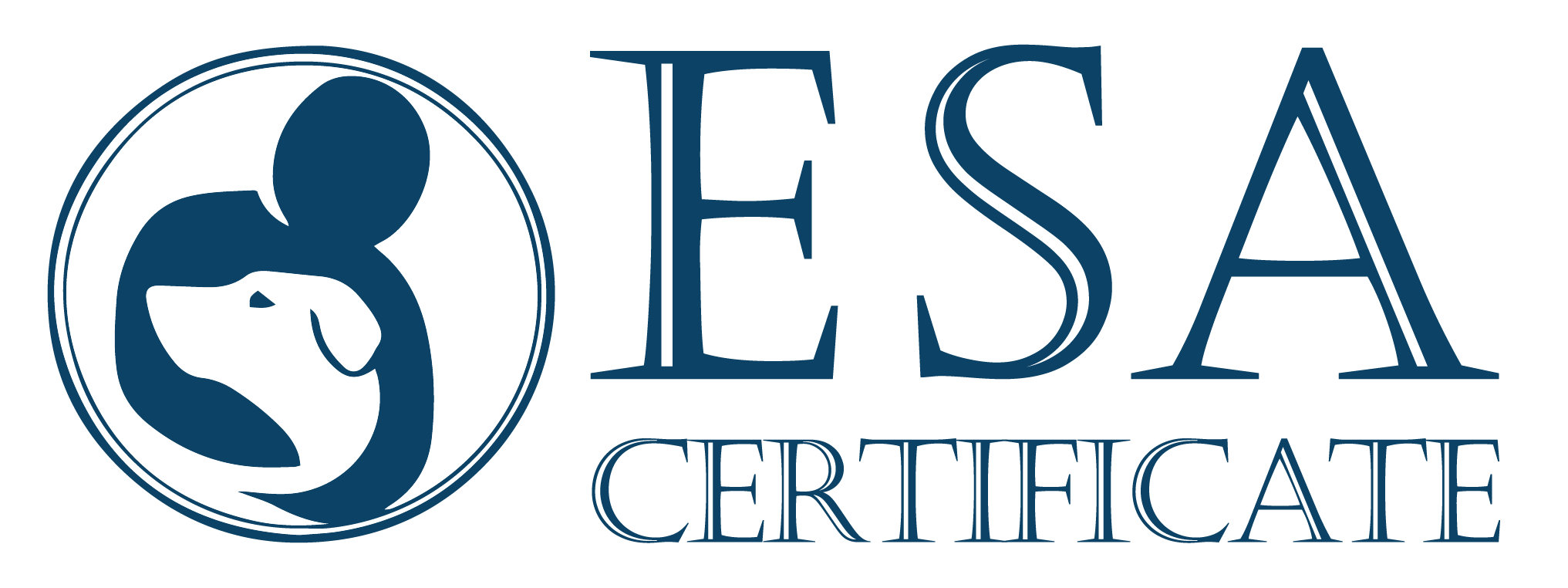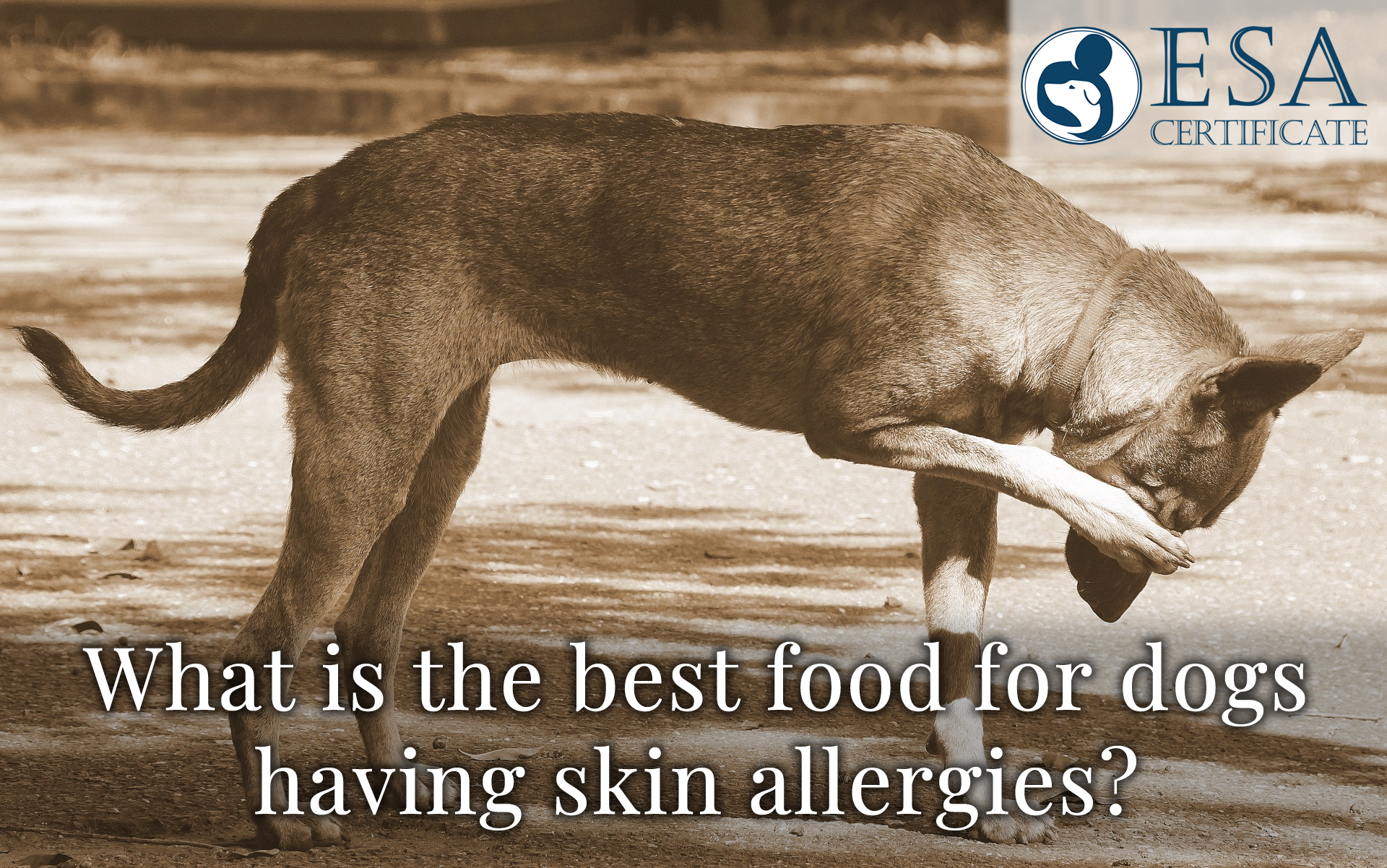Table of contents:
-
What are the common types of allergens in dogs?
-
Treatment for eradicating the development of allergies in dogs
-
Common food allergies in dogs
-
Dog Foods with limited ingredients
-
Best Hypoallergenic food for dogs having skin allergies
1. AvoDerm Natural Dog Food
2. The Honest Kitchen Dehydrated Dog Food
3. Blue Basics Limited Ingredient Diet
4. Hill’s Science Diet’
5. Blue Buffalo Wilderness
-
Food Allergy or Food Intolerance?
-
Dog Food Elimination Diet
-
Homemade Dog Food for treating allergies
-
Keeping your dog healthy
The main reason that allergies in dogs are not discussed widely as much as allergies in humans because our little four-legged friends are not able to convey their symptoms to us. The symptoms and causes in dogs, as well as humans, are mostly similar. The slightest difference is that humans have a better thermal regulatory mechanism. Along with that, dogs have a lot of hair (fur) in contrast to the hair in humans.
Luckily, dog allergies are also being taken seriously by the owners. Along with that, most veterinarians also suggest testing dogs whether they have any allergies, if the dogs do, they try to concentrate on finding what type of allergies they have. One of the major problematic allergies for dogs is a food allergy. Food allergies are known to cause rashes, itchy skin, sneezing, etc. These types of symptoms can cause a lot of inconvenience to your furry friend. When such types of problems occur, you would have to change your dog’s diet by either providing new sources of food or give them hypo-allergic substances to prevent the immune response from getting triggered.
What are the common types of allergens in dogs?
As in humans, allergies in dogs are an overwhelming reaction of the dog’s immune system because of a specific compound or a particle. The most common allergens in the case of both humans and dogs are dust, pollen, etc., which can be non-irritant in other humans or animals.
The particular reasons for an allergy to occur in dogs are similar to humans. For example, an insufficient early age exposure to certain particles can trigger a reaction later in life. When food allergies are formed inside a dog’s immune system, the toxic compound that is the cause for the allergy can be in the mix with its immune system making everything dangerous. This includes some of the beneficial components that are necessary like proteins.
Usually, the common causes of allergies are pollen, dust, dander, plants, insects, etc. Apart from these causes, dogs can also develop food allergies making them sensitive to some of the important protein sources such as chicken, lamb, veal, etc. Protein allergies are not so common among humans. Therefore, most people won’t think that their pet is going through a protein allergy and won’t concentrate on that aspect.
Ultimately, it should be taken into consideration that all dog breeds won’t be subjected to the same risk of having allergies. This might differ depending on the breed as some traditional races are known to have a wider gene pool and are able to sustain these types of allergies. However, smaller breeds and show breeds are more likely to have an allergy.
Treatment for eradicating the development of allergies in dogs
Even though you try your level best for reducing the chances of your dog developing allergies with an excellent upbringing and exceptional nutrition, the dog might still develop an allergy. This is mostly because of the genes of the dog and not at all because of anything you did. Therefore, there is no need for you to feel guilty thinking that the dog developed an allergy because of your fault. However, as most houses are free from dust, the chances of a dog developing allergies are less when compared to the dogs that live outside.
If your dog develops an allergy, you should bring your dog to a vet and strategize a plan to get rid of the allergens in the environment in which your dog lives. You should not only be focusing on the diet, but you should also concentrate on your pet’s diet. In this case, it might be more advantageous if you could know more about the specific allergy that your dog has developed. This makes it easier for you to remove all the allergens that can be a possible cause of the allergy. This test is generally a quick process, where the vet can find out the information by taking a tiny amount of blood sample from your dog.
In addition to that, you should also help your dog to recover from the symptoms by doing certain types of things such as cleaning their fur, rubbing some anti-microbial creams or anti-bacterial creams, cleaning their paws, and more.
Common food allergies in dogs
Food allergies happen to be one of the most common types of allergies in dogs. Some of the most prevalent signs of a food allergy are itching, sneezing, itchy paws, hotspots, rashes, scaly skin, oily skin, pigmented skin, and sometimes even skin that becomes a little bit like leather.
Some other signs that indicate your dog might be dealing with dietary insensitivity are ear problems, gas, vomiting, diarrhea, cough, and wheezing.
In most cases, the allergens that can be the probable cause for your dog to develop an allergy are beef, dairy products, eggs, wheat, chicken, lamb, soy, pork, rabbit, and especially fish. This information proves that dogs can develop an allergy for more than one reason.
Dog Foods with limited ingredients
Limited Ingredient Dog Foods are the type of dog foods that majorly contain a specific ingredient, with very little possibility of containing other components. When you provide food with limited ingredients to your dog, you can narrow down the list of things that can cause an allergy to your dog.
Best Hypoallergenic food for dogs having skin allergies
Even though there is an availability of the best quality products in the market, the impact of hypoallergenic dog foods will completely depend on the cause for developing an allergic reaction. Most common types of food allergies will have atopic dermatitis as a major symptom. You won’t be able to find out the exact reason unless you conduct a test.
Once you get to know that the specific cause for the allergy, you can be able to remove the allergen from your dog’s diet. This will often leave with the availability of various options along with canned foods that include both dry dog food and wet dog food.
If your dog is having multiple severe allergies, you must search and find the dog food that is acceptable to your dog. This can be a slightly harder process than usual, yet, you will be having a few options available. These types of food can be of help before you begin to prepare your dog’s food from scratch.
1. AvoDerm Natural Dog Food
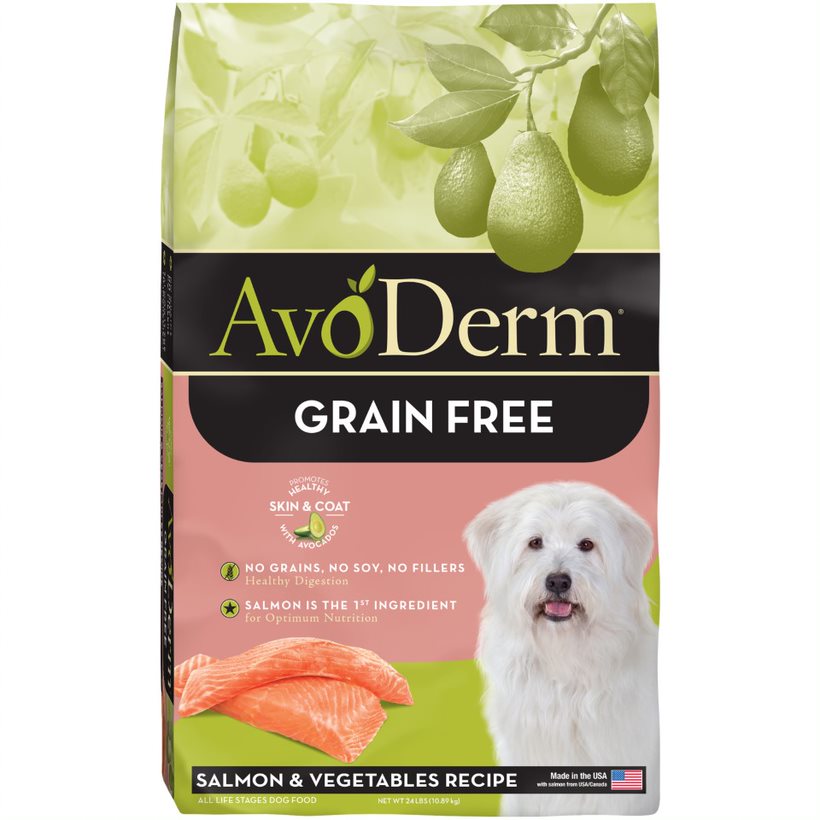
AvoDerm has definitely thought creatively while manufacturing their dog food. Not only choosing an unusual source of protein for their formula, which is salmon, but they have also made use of a rare ingredient for manufacturing dry kibble that is avocado. Avocado not only is a rich source of protein (4%) but also consists of some advantageous fatty acids as a major component (23%). It is also rich in Vitamin C, Vitamin B-6, and Potassium, making it an excellent source for skincare.
Salmon as an animal source for protein is a perfect choice as it has Omega 3 fatty acids. This helps in boosting immunity while aiding for better fur and skin as well. As salmon is an unusual component for dry dog food, it becomes one of the best choices for dogs that are allergic to normal protein sources and especially the best choice for dogs with skin allergies.
Pros:
- Avocado being added as an ingredient in dog food.
- Unprecedented, yet an excellent source of protein.
- Best for skincare and fur in the dogs.
- A simple formula without having many possible allergens.
Cons:
- Some dogs might not be interested in eating fish-based kibble.
- The size of the kibble is larger than usual.
- This kibble is somewhat expensive when compared to some other products.
2. The Honest Kitchen Dehydrated Dog Food
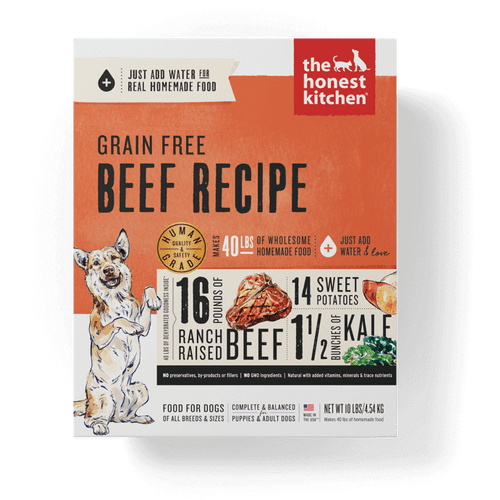
Before hypoallergenic dog food came out into existence, people would try to cook the same food for their dogs that would cook for themselves. Honest Kitchen has taken this into consideration and created a dry dog food variety that has been made with the help of human-grade ingredients, which might not be seen even in the case of premium dog food.
In addition to that, even though beef is a commonly seen food in human cuisine, in dog foods this can be an unusual source of protein.
Eventually, it is essential to know that this is not kibble. Instead, it is a dehydrated food, and you would have to mix it with water to prepare it into wet food. Using the right amounts, i.e., 3 to 1 ratio, you will get around 40lbs of high-quality dog food from a 10lbs bag.
Pros:
- Best-in-class, human-grade, & hypo-allergenic dog food.
- Rich source of proteins.
- Does not contain soy, wheat, or corn that are known to trigger allergic reactions in some dogs.
Cons:
- Food has to be mixed with water and made into wet food before you can give it to your dog.
- Even after the quantity gets increased after mixing with water, it would still be considered expensive.
3. Blue Basics Limited Ingredient Diet
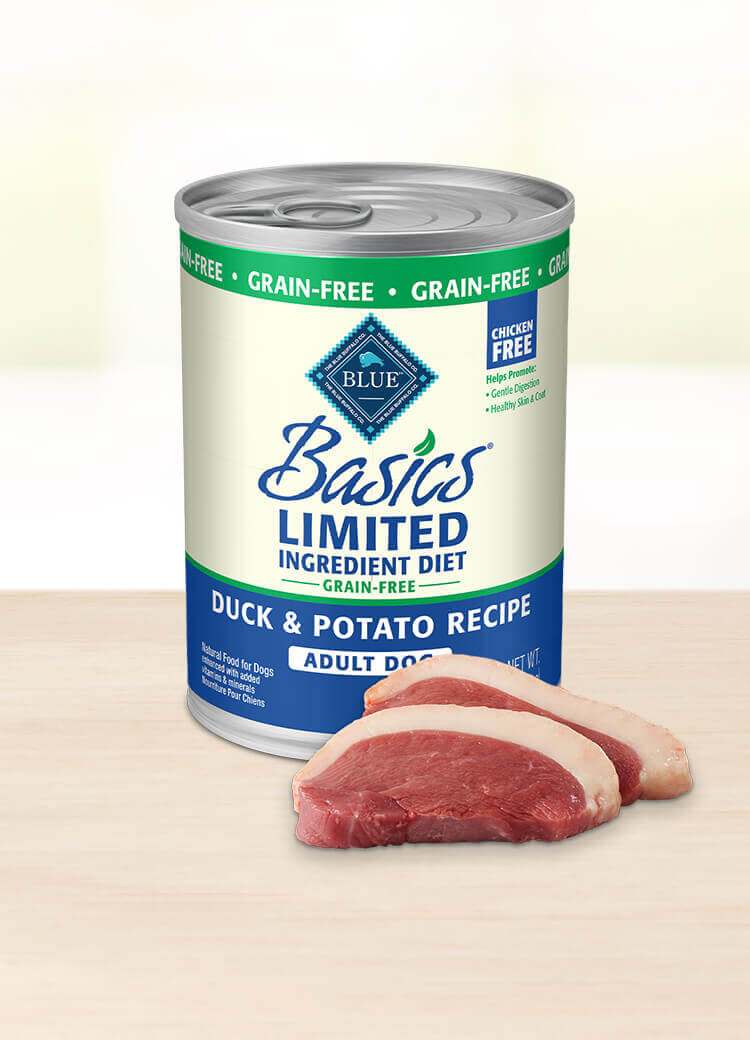
Keeping the allergies in mind, Blue has made wet food based on duck meat. It is also known to have no involvement of other ingredients or fillers that might lead to problems in your furry friend. The source for carbohydrates in this food is potato, which is known to be one of the easily digestible foods for dogs without creating any issues.
When compared to kibble, canned food is rather expensive. However, canned food won’t be having too many ingredients, therefore making it whole and preserved. This means that, apart from the two main elements, the other components present are vitamins and minerals that will in aiding with your dog’s health.
The downside to this food is that it also happens to contain fish oil. The presence of fish oil can either be a great advantage or a drawback. This is due to the presence of a lot of Omega 3 and Omega 6 fatty acids. In some cases, dogs do not like any type of food that smells like fish. Although humans might not be able to recognize this smell particularly, dogs can easily know this and can jump to a conclusion about whether or not they like it.
Pros:
- A simple, yet plain protein-rich formula.
- Duck also falls under the category of an uncommon source of proteins in dog food.
- Does not contain corn, wheat, soy, or grains of any specific kind.
- Does not contain dairy products or eggs.
Cons:
- Larger dogs have a larger appetite and feeding them canned food can involve a lot of money.
- This food does not contain any preservatives and should be used completely once the can is opened.
4. Hill’s Science Diet’
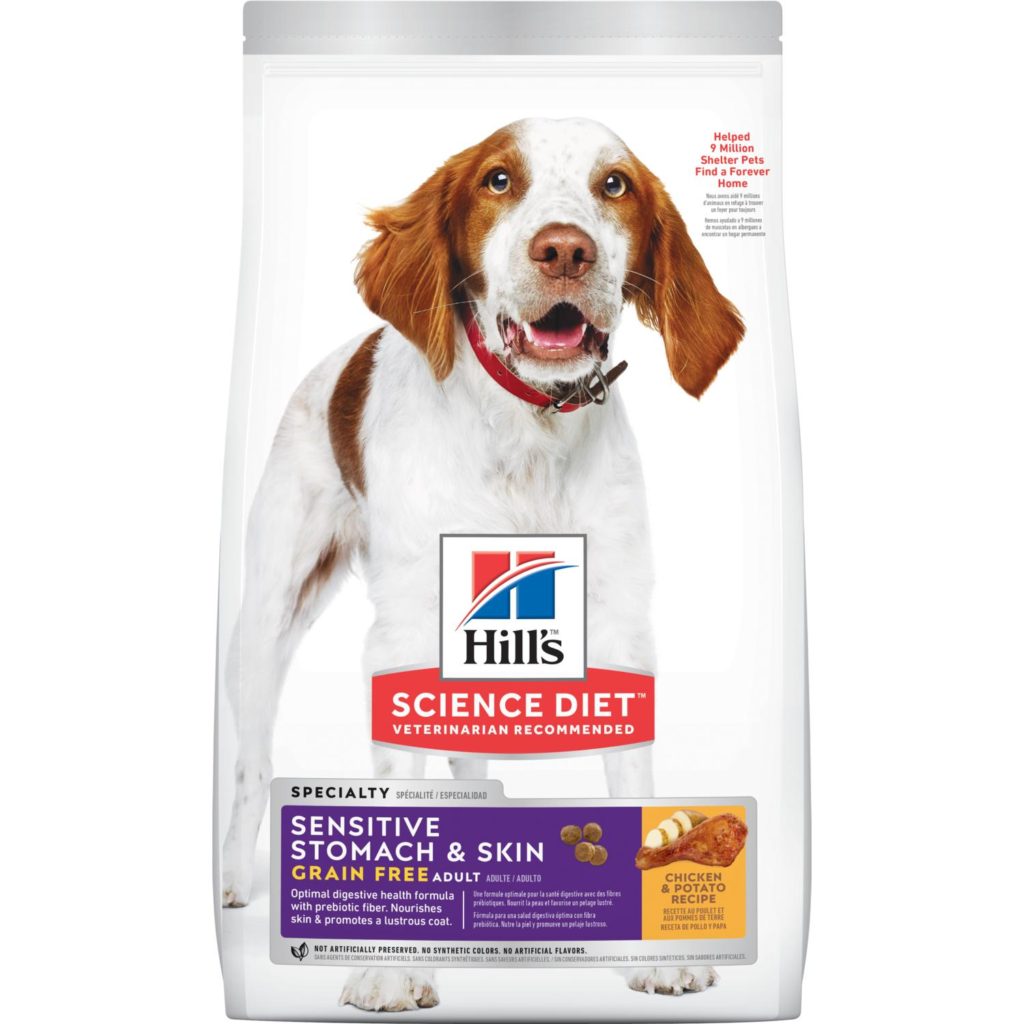
‘Hill’s Science Diet’ is considered one of the best choices when it comes to choosing hypoallergenic dog food. This a common protein-based food that consists of a specialized formula for dogs having food or skin sensitivities. Moreover, this dry dog food has been clinically proven to enhance a dog’s immune system with the help of antioxidants, Vitamin B, and Vitamin E that are heavily included within this food.
It has been presumed that this food will mainly be used in the diet of a dog with allergies. Therefore, a set of clear instructions have been provided on the bag in order to let you know about the details for substituting the current diet with this. Just to make sure that the allergic reactions in your dog don’t get increased, you should replace the already existing diet with this food very slowly. This will give the dog some time to adjust to this food. It is also essential that you look out for any symptoms of sensitive skin.
The only drawback of this product is that chicken is not at all considered a novel source of protein. If your dog is perfectly alright with eating chicken, then you can opt for this. If your dog seems to have allergic reactions when fed with chicken, you might have to look for something else.
Pros:
- Scientifically balanced formula.
- Specially designed for preventing allergic reactions in dogs.
- Considered to be one of the least expensive dog foods of this specific type, when compared to most other dog foods.
Cons:
- Chicken is comparatively a common source of protein in dog food.
- Being rich in carbohydrate content makes it an ideal food for only adult dogs.
5. Blue Buffalo Wilderness
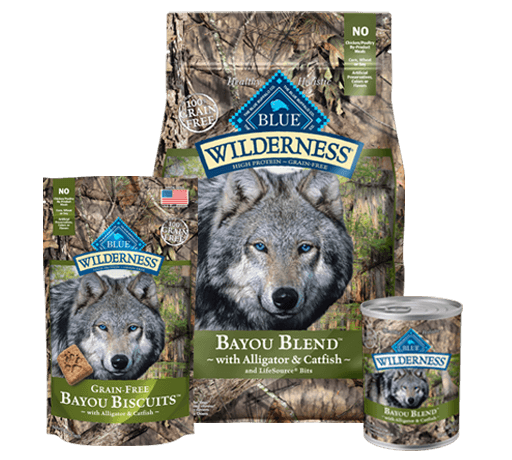
If you are out there searching for a dog food that contains an uncommon source of protein for your dog, you will not get anything more novel than feeding your dog with some ‘gator meat. Yeah! that’s right, you heard it correctly. Alligator meat is not only an unusual source of protein in dog food but it is also considered an unusual part of the diet in humans as well unless you live on the bayou and occasionally eat ‘gator meat.
Along with alligator meat, the protein source in this food is derived from catfish too. The protein in catfish is different when compared to the protein in other fish because it consists of more saturated fats. This makes it to be more similar to land-dwelling animals rather than fish species.
Because of the fact that it is wet canned food, it only consists of very few ingredients. Additionally, there. Won’t be any involvement of wheat, soy, corn, or other grains. What makes it even better is that it does not contain preservatives or added colors.
Pros:
- One of the most unique sources of protein that you can ever find.
- Contains very few ingredients without having any allergens in trace amounts.
- Excellent in terms of nutritional value, when compared to most other canned foods.
Cons:
- This is the priciest dog food that a person can find. Therefore, it might not be suitable for most dog owners, unless they are rich and willing to spend a lot of money on their dogs.
- As discussed earlier, canned should be used completely once opened as they don’t contain any added preservatives.
- Some dogs might not be interested in eating food that contains fish or fish oil.
Food Allergy or Food Intolerance?
Food Allergy and Food Intolerance are two different things that your dog might be experiencing. If your dog is having a food allergy, the immune system of your dog has a misconception that the food taken by the dog is harmful to it. The immune system of your dog will then produce some defensive antibodies that will help to fight the harmful component that has been invading the dog’s body in the form of its food.
On the other hand, Food Intolerance is more of a digestive problem than just an immune response. If your dog is having trouble with the digestion of a specific ingredient in its food. This can be similar to something such as lactose intolerance, but the intolerance can be different in different dogs. The components that a dog can’t break down might cause problems leading to making the dog sick because of indigestion.
Food intolerance creates digestive stress which includes gas, bloating, nausea, vomiting, and diarrhea. Whereas, a food allergy might cause skin rashes, hives, itching, paw biting, obsessive licking, etc., which are mostly related to skin problems.
Dog Food Elimination Diet
If you find your dog suffering from an allergy, which means if you see your dog scratching itself more than usual and displaying some other symptoms of an allergy, they can be able to benefit from a dog food elimination diet.
Skin and blood tests will definitely be required to help in determining the food allergies in dogs. However, these tests are a bit pricey, and in some cases, these might even show false results. A food elimination diet, which is also known by the name of a restricted diet, is a limited menu for your dog so that you can easily identify the food that has been causing an allergic reaction in your dog. In this way, you might also be able to find dog food that won’t be causing any type of allergic response at all.
Some of the ingredients that need to be eliminated in a diet will be recommended by a vet. Also, the most common things recommended by a vet to be added to a diet are proteins from foods based on meats such as rabbits, venison, duck, buffalo, kangaroo, etc., which are a bit novel. In order to provide carbohydrates, a vet might recommend pumpkin, oats, barley, quinoa, and chickpeas. It is better to start with foods that haven’t been introduced to your dog before. This will help you know if anything new might also cause allergic reactions in your dog. If the allergic reactions are not triggered, you will have found a new food that your dog loves without having any allergies.
Homemade Dog Food for treating allergies
Another option available for dog owners while treating their dog’s allergies is creating their own dog food. This method will ensure that your dog’s diet will contain ingredients that won’t cause a problem for it. However, it can also become a rather expensive and time-consuming process, which would also be requiring trial & error in the procedure. Anyhow, this method is known to do wonders for the digestive as well as sensitive skin issues in your dog.
As the person that decides what ingredients should be mixed and what shouldn’t, you can choose a protein of your choice. You can also make it free from grains and improve your dog’s health.
Keeping your dog healthy
After being able to successfully determine the reason for your dog’s allergies, you must try to provide your dog with a food source that is free from any of the ingredients that might cause even the slightest allergic reaction. You should concentrate more on simple mixtures that will give your dog all the necessary nutrients required for good health as well as its growth & development. This also makes them free from the risk of having a severe allergic reaction, which could possibly lead to rashes, fur loss, indigestion, itching, etc.
If your dog is currently suffering from atopic dermatitis, you should make certain that you soothe the symptoms by applying an anti-itch ointment or any other remedy depending on the canine’s skin type. It might seem better to give a bath to your dog more often than usual, but the water can dry its skin, fuzz the fur, and make the problem even worse. Apart from skincare treatment, it is also advantageous to brush your dog regularly. This will not only help in clearing the skin problems, but it will also help your dog to calm down and feel more relaxed during such a period.
After the problem has successfully been cleared, you should still continue feeding your dog with the dog food for skin allergies because you have only taken care of the symptoms and not the actual issue. As in humans, the allergies in dogs are never really cleared. However, they can be avoided by providing a neat environment and clean food for your dog.
